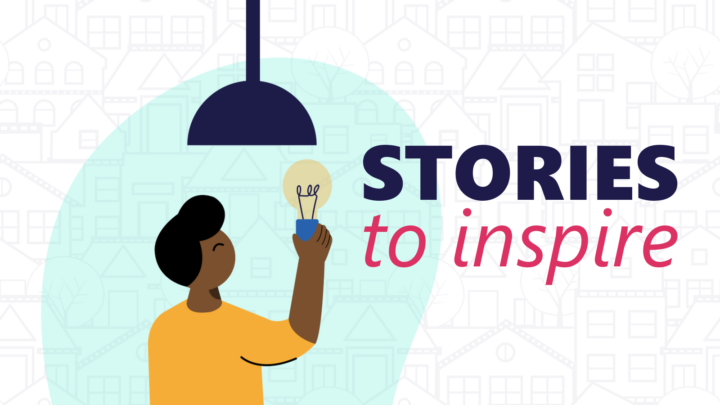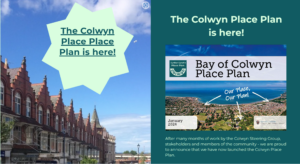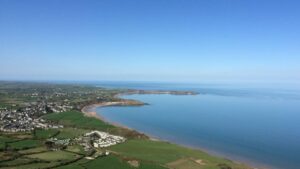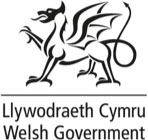Stories to Inspire
Each month we shine a spotlight on a different community-led housing group from across Wales making a difference and creating positive change in their area.

July 2024
Our spotlight this month is on Capel Prion, a group that the Communities Creating Homes team are supporting in Denbighshire.
The following article is courtesy of the Architectural Heritage Fund website

The Architectural Heritage Fund (AHF) has announced a Project Viability Grant to Capel Prion for its project at a much-loved historic chapel. This was one of eight awards made at the latest grants meeting, where projects across England, Scotland and Wales were awarded funding totalling £80,000.
Dating back to 1792, Prion Methodist Chapel is located in the centre of the village and has been a focal point of community life for over 200 years. The Grade II-listed building was altered and extended in the mid-19th century in the Simple Round-Headed style. It has a rendered façade, with doorways flanking four tall margin glazed windows, and also incorporates an upper schoolroom and an adjoining 19th-century manse.
Following the closure of the chapel in October 2023, a group of 30 local residents came together with the aim of bringing the chapel into community ownership and giving it a new use. The group is being supported by Cwmpas’ Communities Creating Homes and, between them, they have identified a lack of affordable housing for rent as a key challenge for people being able to stay in the area. To address this need, the group’s preferred option is to transform Capel Prion into two affordable homes available for rent to people with a local connection.
Kathryn Robinson, Community-Led Housing Enabler at Cwmpas, said on behalf of the community: “The chapel has been a focal point of community life in Prion for generations – a hub at the very centre of our identity, culture and language. Its closure poses a threat to the constancy of its presence in all of our lives, and for this reason we are thrilled to have received grant funding from the AHF which will enable us to explore the feasibility of bringing it into community ownership for the benefit of local residents now and in the future.”
The AHF grant, made possible by support from Cadw, will enable the group to commission professional advisors to complete a series of surveys and develop the plans. It will also cover legal fees to formally establish a new incorporated organisation, as well as allow the group to continue its community engagement work.
June 2024
AUTHORS: Louise Gray[1], Pat Gregory[1], Jonathan Hughes[2], Claire White[2], Neil Turnbull[3], Juan Usubillaga[3], and Juan Fernandez[3]
Homes are the foundation of our lives. They are essential to our physical and mental health and wellbeing. Yet, very often, the housing system fails people who need it the most. In simple terms, we do not have the right number or type of homes, or these are not truly affordable for many people. Since late 2023, a collaboration started between Cwmpas, Co-op Dan Do and a group of researchers at Cardiff University. This collaboration led to the securing of fundings to organise a series of workshops to discuss the current state and future challenges of Community-led housing in Wales, around three main topics: 1. Benefits and Affordability, 2. Land and Finance, and 3. Design and Governance.
To date these events have been attended by a wide range of people with lived experience of community-led housing, as well as professional practitioners, representatives from professional organisations, government officers, and academics.

Our approach to the project is informed by Participatory Action Research Principles and is inspired by Brazilian educator and philosopher Paolo Freire’s (2017 [1970]) call to work with rather than for communities – also a key principle of a placemaking approach. The co-design of the work promotes practical usefulness for everyone involved, which we believe is key in community-led housing projects as they require involvement of multiple stakeholders and navigating a complex universe of policies, procedures, and practices.

The term community-led housing encompasses several models including Co-operative Housing, Cohousing, Community Land Trusts, Self Help Housing and Tenant Management Organisations. It involves people coming together to decide what kind of homes and communities they want to live in. Communities play a central role in creating decent and affordable homes. Community-led housing schemes are characterised by providing housing that is affordable in perpetuity thereby providing far greater certainty to local communities in meeting housing needs and offering new opportunities and benefits for sustainable local economic, social, and environmental development. It is not a one-size-fits all model, and in fact it can be adapted and moulded to create bespoke design proposals that respond to specific spatial and social factors in local communities.

There is a clear synergy between community-led housing and placemaking, particularly since both put people at the heart of design and development processes, with a clear aim to improve people’s lives and foster a sense of belonging. The Design Commission for Wales Placemaking Guide states that:
‘’Placemaking places people at the heart of the process and results in places that are vibrant, have a clear identity, and where people can develop a sense of belonging’’ (Placemaking Guide 2020 DCfW)
Some characteristics of community-led housing that help put placemaking into practice are demonstrated by the following ideas:
- Community as the Expert – residents are the experts in the communities in which they live or wish to live.
- Creating places, not just houses – placemaking is at the heart of every decision in the development of community-led housing, as communities strive to create places where they can thrive. A shared vision and principles are instrumental to overcome obstacles with a willingness to refine, adapt and change without compromising the creation of ‘place’.
- Partnerships – developing community-led housing involves establishing links and networks with a variety of people and organisations to develop joint responsibilities that go beyond traditional client-professional transactional models.
- ‘Placekeeping’ – placemaking never ends but instead evolves into placekeeping. Places and people are always changing, and so spaces need to adapt to new needs and consider long-term sustainability.
Placemaking has become even more critical to everything that we aspire to achieve in our communities. Arguably, the impact of the pandemic has allowed us to reflect on where we spend most of our time, appreciating spaces in our communities, and contemplating how we can make them better. It is these personal and community-based experiences that are central to how our communities evolve.
We are hopeful that our project helps to lay the groundwork for fertile conversations between key stakeholders in community-led housing development processes, as well as impactful research that can be used by them to facilitate the creation of community-led housing developments following a placemaking approach.
Endnotes
Within Cwmpas, the Communities Creating Homes programme exists to support people and communities to develop their own community-led housing schemes. It is funded by the Nationwide Foundation and Welsh Government. Further information on the programme can be found through this link: Communities Creating Homes – Cwmpas.
Co-op Dan Do are a not-for-profit community group wishing to own and develop land for collaborative enterprise and housing. We aim to set up affordable, low impact living in eco homes, set in a permaculture landscape designed for beauty, bio-diversity and productivity. Dan Do will develop around 20 low-impact eco homes for people, at least 50% in housing need (as defined by local authorities). A mixed tenure development, some people will rent, others will own a proportion of their home. A creative and supportive, multi-generation community, we will democratically include all members in the decision-making.
Cardiff University is a member of the Russell Group, a group of 24 leading UK research intensive universities. This project ‘Alternative forms of living: Developing a community-led housing network in Wales [No. 525431]’ is funded by the Arts & Humanities Research Council (AHRC) through their Impact Acceleration Account (IAA) and aims to disseminate exiting research and support the creation of a community-led housing network. The research is hosted by the Welsh School of Architecture, with support from the School of Geography and Planning, and aligns with the university’s civic mission.
References:
Freire, P. 2017 [1970]. Pedagogy of the Oppressed. UK: Penguin Random House.
Design Commission for Wales (2020). Placemaking Guide.
[1] Coop Dan Do
[2] Cwmpas
[3] Welsh School of Architecture, Cardiff University
May 2024
A new housing development in the Gower will be led and part built by the community, following a grant from Welsh Government. In a first for Wales, 14 carbon-zero homes will be created using labour from its residents to build equity, an innovative approach known as ‘sweat equity.’
The project will provide affordable homes for people in the area facing the impact of Wales’ housing crisis – including children living in temporary accommodation. Gŵyr Community Land Trust (Gŵyr CLT), with support from Cwmpas’ very own Communities Creating Homes Team has been awarded almost £900,000.
Funding will contribute towards planning applications in the village of Bishopston, where Gŵyr CLT will build homes on a third of the 6-acre site if their application for planning is successful. The wider community is being consulted on how they can best use the remaining two thirds of the land, with their ideas including a community orchard, green spaces and allotments for growing food. This will be available to everyone, not just the residents.
Claire White, from Cwmpas’ Communities Creating Homes Programme, explained: “By taking on a self-build approach, the residents are providing a solution to home ownership that would otherwise be out of reach. It will be the first time this approach, known as sweat equity, has been used in Wales and Gwyr CLT hopes to inspire other communities to do the same.”
Gŵyr CLT was formed in 2020 by local people who were “fed up” with the precarious private rented sector and long waiting lists for social housing. They recognised they were not alone in being unable to afford secure or suitable housing where they live and work, and worked together to solve a problem.
The CLT model will provide leasehold shared-ownership homes, while the CLT owns the freehold of the land with an asset lock that means it can never be sold for another purpose.
Residents will not be able to acquire more than 65% of the leasehold of their homes and the property value is linked to the local average wage. Homes cannot be sold to anyone who is not in housing need and does not have a local connection, as defined by Swansea County Council policy.
Emily Robertson, volunteer board member of Gŵyr CLT, explained the difference the grant award could make: “This grant from Welsh Government demonstrates a real understanding of many people’s lived experience in Wales – housing insecurity, children living in temporary accommodation, parents’ wages being sucked up by expensive rents, lack of affordable housing due to Airbnb and second homes – and a real commitment to test a model of delivering sustainable and equitable housing, with the potential to transform thousands of people’s lives blighted by the housing crisis.
“As a small group of dedicated volunteers, we are delighted to see our hard work pay off and are excited for the next steps. We look forward to sharing our experience with other community-led housing groups across Wales”.
Gŵyr CLT is awaiting the response of its pre-planning application, with a view to submitting a full planning application by the end of 2025.
April 2024
Bro’r Eifl is a Community Land Trust which includes the villages of Llanaelhaearn; Trefor; Llithfaen and Pistyll. These are communities where Welsh is the language of everyday life. They form the gateway into the tourist hot spot of Pen Llŷn. Much like many other parts of beautiful North Wales, locals are being forced to move elsewhere for cheaper housing, which has an effect on the Welsh language and on the workforce in the area.
Cian Ireland, Chair of Bro’r Eifl Community Land Trust (CLT) said the electoral register shows that theses four villages have a combined population of 1,000 people.
“The idea around the CLT model is that the communities come together to own land that can then be used for the benefit of the community. This can be all manner of different things. CLTs have bought bakeries or local businesses and land to try and keep the communities going as well as addressing housing issues.”
Bro’r Eifl’s ultimate goal is either to buy a parcel of land within Bro’r Eifl to build houses or buy existing buildings which can be turned into homes. The finished properties would then be let to locals on a secure long-term tenancies for an affordable rent. Bro’r Eifl CLT received a small grant from Perthyn to set up the Community Land Trust and to conduct a survey of local housing need.
“There are many different issues and they all feed into each other that makes it difficult for people to get housing. A lot of the work around here is insecure and seasonal so people can get the hours during the summer but come winter it gets more difficult. These income issues, as we know in rural Wales, has led to a massive housing crisis and inflated prices.”
Prices were already out of reach of most locals before the Covid pandemic, but since then, prices have increased and are now even higher than usual, and on top of that there are issues around the actual standard of housing as well. Many of the houses in the area were built around the quarry and they’re quite small and haven’t been modernised.
“We need appropriate housing and families need bigger houses if they’re to stay in the area. Another example I know of is local people who are disabled and haven’t been able to get access to a bungalow or an accessible flat for a disabled person”
The village of Llanaelhaearn has a proud history of collective working. Antur Aelhaearn was established there in 1974 – the first community enterprise in the UK. The Community Land Trust is, “a separate organisation but there are people who are involved with Antur helping out on this.”
Antur Aelhaearn was established on the back of a threat by the then Caernarfon County Council to close the village school. The local quarry had closed and pupil numbers had fallen but people power saved the school from closure. In 2020 Gwynedd Council again earmarked the school for closure and this time around no objections were received during the statutory consultation period.
Now that Bro’r Eifl have been constituted as a community land trust, the next step will be trying to raise funds in order to bring their ideas to fruition.
March 2024

February 2024
Rhisom was founded by a small group of LGBTQIA+ people living in Cardiff following a series of community-organised workshops. Our aim is to create a platform for queer people to engage in wider political action and community building. This means fostering a home rooted in connection to nature, community and culture in which justice, sustainability and compassion thrives.
Rhisom became officially registered as a cooperative society with the Financial Conduct Authority (FCA) in May 2023, and currently has six members.
Our core values are Radical Care, Respect, Pluriversality, Interdependence, Abolition and Food Justice. We want to care for each other and other beings in a non-individualistic way, recognise, value and learn from our differences whilst challenging normative practices and beliefs. We want to foster a culture of shared responsibility, open communication and promote transformative systems whilst dismantling punitive ones. Naturally, healthy sustainable food is central to Rhisom.
Right now, we have set eyes on a property in Cardiff which is perfect for the community space and home we want to build for our members. We are in the middle of writing an application for Welsh Government’s Land and Buildings Development Fund that will hopefully award us with the appropriate funds to secure the property.
We are hoping that the Cardiff Council will recognise the importance of our project and the positive impact it will have on the wider community and will grant us a planning permission to bring our project to fruition. Casey and Jonathan from Cwmpas are doing an amazing job at supporting us through these heavily bureaucratic processes.
January 2024

Over the past few months we here at Cwmpas’ Communities Creating Homes team have been supporting Nefyn Town Trust to realise their ambition of expanding their existing community-led housing offer by developing four new homes in the town.
The primary objective of the Trust is to provide high-quality homes to rent at affordable rates. Over a period of many years they have developed a reputation as a socially-conscious, responsive and reliable community landlord, committed to the wellbeing of their tenants and the maintenance and modernisation of the homes they manage, which currently total twenty-six.
At the end of 2023 Nefyn Town Trust received a revenue grant through the Welsh Government’s Perthyn programme. This grant – which aims to sustain Welsh-speaking communities through the establishment of social enterprises, co-operatives and community-led housing projects – is helping the Trust to compile feasibility reports on two different sites in Nefyn. We as a team have the great pleasure of working alongside the board of trustees to identify gaps in knowledge, commission specialist surveys and – most importantly – consult the community about local housing needs and future aspirations.
We are extremely excited to watch this project succeed in its goal to bring more affordable homes for rent to a region of North Wales severely impacted by the second homes and holiday lets crises, and we look forward to updating you again in the near future.
Feeling inspired?
For more information about the support we offer community-led housing groups, phone 0300 111 5050 or email co-op.housing@cwmpas.coop









